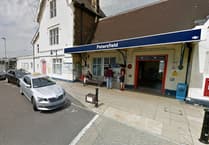THE Herald played a key, albeit unintentional, role in bringing Ann-Marie Wade to justice – after its report on Waverley’s 2016 Air Quality Status Report to Defra prompted local air quality expert David Harvey to investigate.
On analysing the council’s report, published in May 2017, the Herald reported that levels of air pollution had increased at more than two thirds of monitoring locations in Farnham – contrasting with Waverley Borough Council’s official position that air quality was improving in the town.
The disagreement centred around the application of a ‘local bias’ factor, with Waverley’s reported figures applying this factor, while the Herald based its coverage on the raw, unadjusted data.
Waverley is allowed to adjust data gathered from less-reliable (but relatively cheap) ‘diffusion tubes’ dotted around Farnham, using figures from a more-reliable (but more costly) ‘continuous analyser’ (the latter pictured below at the Royal Deer junction).
However, on analysing the council’s figures in 2017, the Herald noticed that, while the local bias factor showed a marked improvement in air quality, the raw data suggested the opposite – and so reported as much.
Mr Harvey, director of ADM Ltd, took issue with the Herald’s approach – but on receiving an explanation, took up the matter with Waverley, later submitting a Freedom of Information (FOI) request to see the monthly figures feeding into the council’s report.
This request alerted Waverley to the “discrepancies” in Ann-Marie Wade’s data and eventually led to her arrest and sentencing last week at Guildford Crown Court.
Mr Harvey was alongside the Herald in court to hear Judge Rufus Taylor hand Wade a suspended prison sentence, 150 hours’ unpaid work and £1,500 costs.
“It’s nice to draw a line under it and move on, but I’m not particularly enlightened as to what her motives were,” said Mr Harvey following the hearing.
“If it was about her trying to make her job easier – the fact is it was probably easier to do her job properly then to make up the figures.
“She did quite a good job falsifying the data. Yes, she got some of the hours wrong and the number of days in a month wrong, but it looked credible, and what she did was actually quite creative.
“It only came to light because she made a hash of the bias factor, and then refused to discuss it with me. If she’d done those and calculated those correctly then she would have got away with it for a while longer.”
Although Wade was culpable, Mr Harvey said it remains the council’s responsibility to ensure the data submitted to Defra is accurate, and asked: “You’ve got to ask who else was responsible?”
However, he praised Waverley for the steps taken since the fraud came to light, adding its status report this year was “the best and most comprehensive I’ve seen”.
He continued: “The data is now checked by a number of different outfits, meaning something like eight different people would have to be involved in the conspiracy.”




